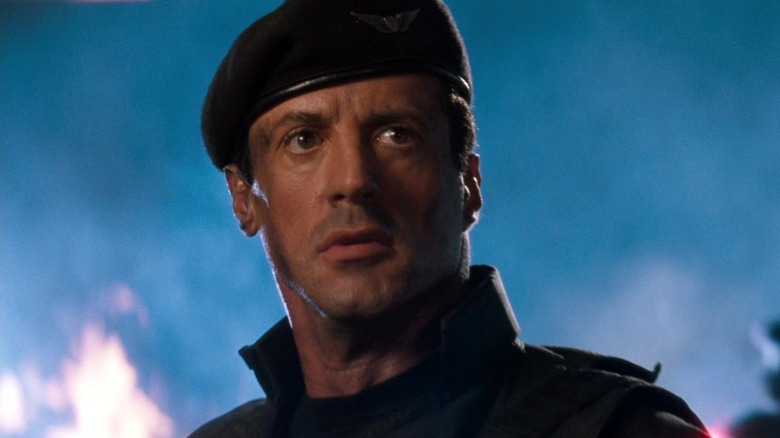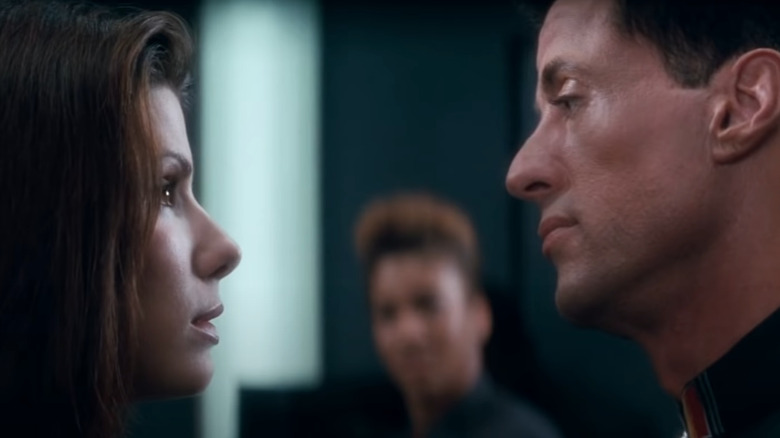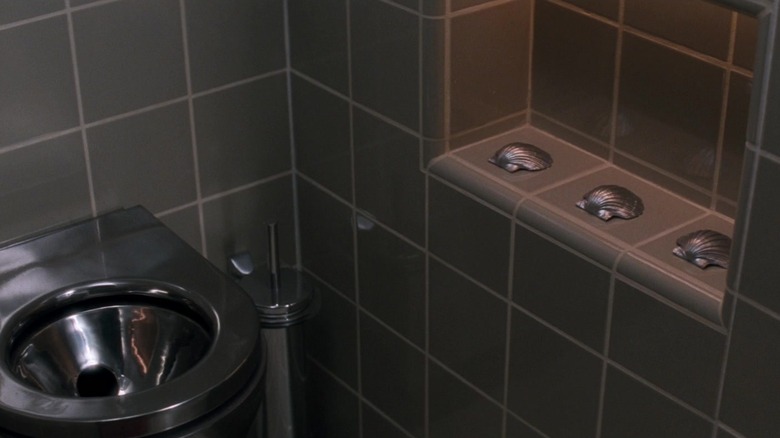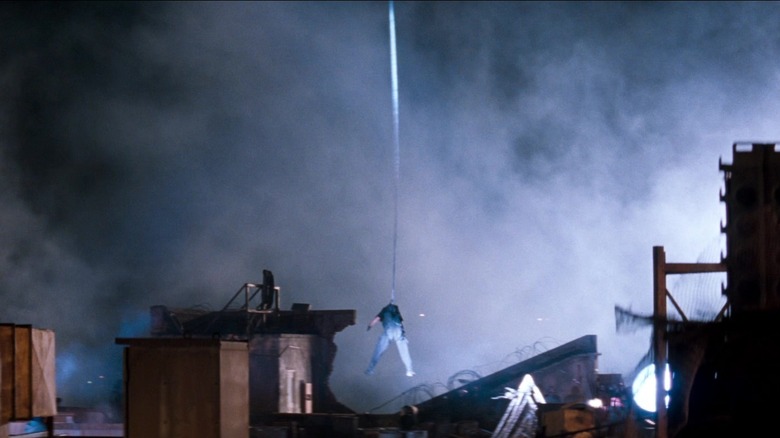Writer Daniel Waters' Favorite Demolition Man Joke Never Made It Into The Movie
By 1993, Sylvester Stallone was an established action star, thanks to three "Rambo" films and five "Rocky" movies. But after his rival, Arnold Schwarzenegger, tricked him into starring in the abject "Stop! Or My Mom Will Shoot", the then-46-year-old needed to reassert himself. And so, '93 was the year Stallone returned to action, first as Ranger Gabe Walker in rock climbing thriller "Cliffhanger," before facing off against Wesley Snipes in "Demolition Man."
The latter was the project of big-time action producer Joel Silver, the man responsible in large part for the "Lethal Weapon" and "Die Hard" franchises. "Demolition Man" saw Stallone play John Spartan, an LAPD cop who's given a 70-year-long "cryo-sentence" after being wrongfully convicted of indirectly killing hostages in pursuit of his criminal nemesis, Simon Phoenix (Snipes). He's thawed out in the year 2032 to help the police track down Phoenix, who was also cryogenically frozen but escaped after being thawed out for parole.
At one point, Stallone bungee jumps out of a helicopter. It was the kind of highly-enjoyable big-budget nonsense you only get from a '90s action movie, and as the production ran on, that budget grew. The movie eventually made $159 million on a $45 million budget that had climbed to a reported $57 million. Some even claimed that figure hit $97 million including marketing.
Much of that was down to the production being behind schedule from day one, as well as real-life Demolition Man Joel Silver's penchant for blowing things up in as expensive a fashion as possible. But with Stallone onboard and Silver producing, Warner Bros. wasn't worried. Still, the film had an undeniably troubled production that eventually saw big changes made to its script and entire subplots cut. One unintended tragedy of the cuts was screenwriter Daniel Waters' favorite joke.
A troubled production
"Demolition Man" was far from an easy production. An LA Times set visit revealed the film was initially scheduled to run over 72 days but had already surpassed 110 by the time reporter Patrick Goldstein made it to the Burbank soundstage where it was filming. During that time, original female lead Tori Petty was replaced by Sandra Bullock (whose awkward sci-fi love scene is a standout in the final film), Sylvester Stallone pinched a vein in his shoulder and had to rest for nine days, and the movie had seen so many crew members replaced that by the end, a crew hand told the Times, "There's probably only a dozen original crew left (from a main crew of 160). Joel [Silver] and Marco [Brambilla, director] don't even know anyone's name anymore." There were also numerous cuts made to the story before the final version debuted, including a subplot featuring Spartan's daughter.
Even before filming got underway, the script had gone through numerous iterations, with multiple screenwriters providing rewrites and story changes. One such writer was Daniel Waters, whose biggest credit up to that point had been on Tim Burton's 1992 "Batman" sequel, the weirdly experimental "Batman Returns." Waters has said he made significant changes to the original "Demolition Man" script, to the point he was given first credit on the screenplay. And much of the film's humor was his handiwork, with Waters telling Vulture in 2020, "There was no attempt at comedy in the first drafts of the script." That all changed once he'd finished with the screenplay, but one of his favorite jokes never actually made it to the final film.
The three seashells
Much of the comedy in "Demolition Man" comes from John Spartan's interaction with the sanitized 2032 version of LA, known in the film as San Angeles. This was Daniel Waters' vision of a conglomerated San Diego, LA, and Santa Barbara, which had been made over in the image of the real LA's Universal Citywalk shopping area into a sexless corporate dystopia where crime and subversive behavior, in general, was no longer tolerated.
Early in the film, after Spartan has been thawed out, he returns from the bathroom to inform Lieutenant Lenina Huxley (Sandra Bullock) of the lack of toilet paper in the facility. He's met with confusion before his fellow officers mock him for not knowing "how to use the three seashells." Just how the seashells actually work is never revealed, and it turns out the whole concept came from a brief phone call between Daniel Waters and his screenwriter friend Larry Karaszewski. In 2018, Waters revealed to Live for Films that Karaszewski was on the toilet during their call and when asked for "some toilet stuff" for the film, told Waters he had a "bag of seashells" nearby.
Those shells eventually found their way into the movie audiences saw. But in the Vulture interview a couple of years later, Waters recalled how his "favorite joke of the script" actually didn't make the cut:
"After [Sylvester] Stallone tries to deal with the seashells in the bathroom, he washes his hands, and when he tries to dry them, it's the same s***ty hand dryer that we have today. He's like, 'What the f***? You guys have done all this and you still haven't come up with a good hand dryer?'"
Waters made a fun film better
The hand dryer joke was only a small casualty in the grand scheme of things. But the seashells themselves have been a source of intrigue for years. YouTube is littered with videos pontificating on how they work — and Daniel Waters revealed to Vulture that he was even accosted during jury duty by a bailiff who was convinced she'd solved the mystery:
"I'm wearing my T-shirt that says 'Ask Me How To Use The Three Seashells.' I was doing jury duty, and this bailiff comes up to me after we're dismissed, and she's like, 'I have a theory for the three seashells,' and goes into this elaborate thing about how you use one seashell to pinch apart your bottom, the other seashell to pull out the excrement, and then the third seashell has a hose that washes off the remains. I'm like, 'Sure. Does this mean I'm out of jury duty?'"
All of this simply serves as a reminder that Waters really wasn't trying to be prophetic or make some grand political point with his view of a restrictive, broken utopia. The jokes about how bathroom procedures might have changed are about as reflective as "Demolition Man" gets. This is exactly what's required when you've got Sylvester Stallone bungee jumping out of helicopters and Joel Silver blowing up buildings in ever more extravagant ways. Throw in a bathroom joke or two, and though it may not have the waterlogged aesthetic of most '90s action movies, you've got one of the most entertaining, albeit slightly zany, action flicks of the decade.



